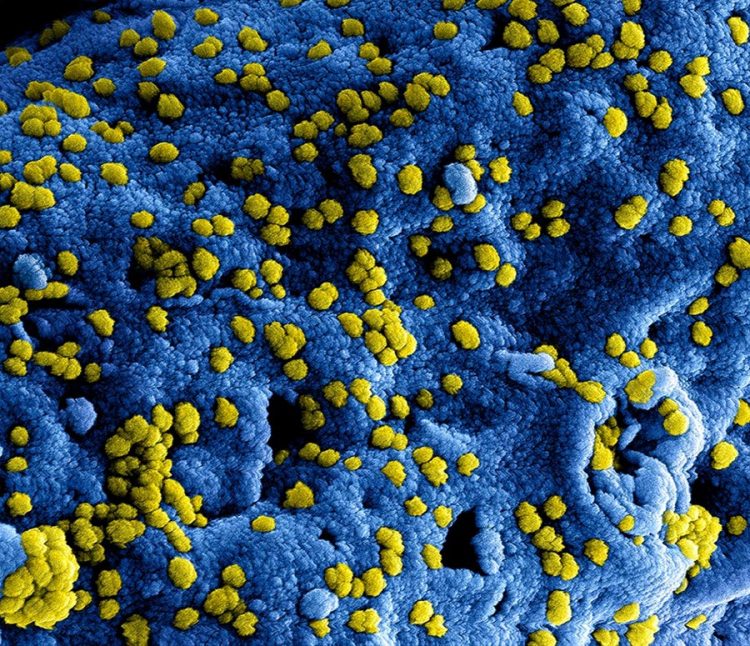Remdesivir prevents MERS coronavirus disease in monkeys

Colorized scanning electron micrograph of Middle East Respiratory Syndrome virus particles attached to the surface of an infected cell. Credit: NIAID-Frederick
The experimental antiviral remdesivir successfully prevented disease in rhesus macaques infected with Middle East respiratory syndrome coronavirus (MERS-CoV), according to a new study from National Institutes of Health scientists. Remdesivir prevented disease when administered before infection and improved the condition of macaques when given after the animals already were infected.
The new report from NIH's National Institute of Allergy and Infectious Diseases (NIAID) appears in the Proceedings of the National Academy of Sciences.
MERS-CoV is closely related to the 2019 novel coronavirus (SARS-CoV-2, previously known as 2019-nCoV) that has grown to be a global public health emergency since cases were first detected in Wuhan, China, in December.
Remdesivir has previously protected animals against a variety of viruses in lab experiments. The drug has been shown experimentally to effectively treat monkeys infected with Ebola and Nipah viruses. Remdesivir also has been investigated as a treatment for Ebola virus disease in people.
The current study was conducted at NIAID's Rocky Mountain Laboratories in Hamilton, Montana. The work involved three groups of animals: those treated with remdesivir 24 hours before infection with MERS-CoV; those treated 12 hours after infection (close to the peak time for MERS-CoV replication in these animals); and untreated control animals.
The scientists observed the animals for six days. All control animals showed signs of respiratory disease. Animals treated before infection fared well: no signs of respiratory disease, significantly lower levels of virus replication in the lungs compared to control animals, and no lung damage. Animals treated after infection fared significantly better than the control animals: disease was less severe than in control animals, their lungs had lower levels of virus than the control animals, and the damage to the lungs was less severe.
The scientists indicate that the promising study results support additional clinical trials of remdesivir for MERS-CoV and COVID-19, the disease that SARS-CoV-2 causes. Several clinical trials of remdesivir for COVID-19 are under way in China, and other patients with COVID-19 have received the drug under a compassionate use protocol.
The Biomedical Advanced Research and Development Authority (BARDA), part of the U.S. Department of Health and Human Services, also provided support for this study. Gilead Sciences, Inc., developed remdesivir, also known as GS-5734, and collaborated in the research.
MERS-CoV emerged in Saudi Arabia in 2012. Through December 2019, the World Health Organization had confirmed 2,499 MERS-CoV cases and 861 deaths (or about 1 in 3). Because about one-third of MERS-CoV cases spread from infected people being treated in healthcare settings, the scientists suggest that remdesivir could effectively prevent disease in other patients, contacts of patients, and healthcare workers. They also note the drug might help patients who are diagnosed with MERS or COVID-19 if given soon after symptoms start.
###
ARTICLE: E de Wit et al. Prophylactic and therapeutic remdesivir (GS-5734) treatment in the rhesus macaque model of MERS-CoV infection. PNAS DOI: 10.1073/pnas.1922083117.
WHO: NIAID Director Anthony S. Fauci, M.D., and Emmie de Wit, Ph.D., a principal investigator in NIAID's Laboratory of Virology, are available to comment on this study.
CONTACT: To schedule interviews, please contact Ken Pekoc, (301) 402-1663, kpekoc@niaid.nih.gov.
NIAID conducts and supports research–at NIH, throughout the United States, and worldwide–to study the causes of infectious and immune-mediated diseases, and to develop better means of preventing, diagnosing and treating these illnesses. News releases, fact sheets and other NIAID-related materials are available on the NIAID website.
About the National Institutes of Health (NIH): NIH, the nation's medical research agency, includes 27 Institutes and Centers and is a component of the U.S. Department of Health and Human Services. NIH is the primary federal agency conducting and supporting basic, clinical, and translational medical research, and is investigating the causes, treatments, and cures for both common and rare diseases. For more information about NIH and its programs, visit http://www.
NIH…Turning Discovery Into Health®
Media Contact
More Information:
http://dx.doi.org/10.1073/pnas.1922083117All latest news from the category: Health and Medicine
This subject area encompasses research and studies in the field of human medicine.
Among the wide-ranging list of topics covered here are anesthesiology, anatomy, surgery, human genetics, hygiene and environmental medicine, internal medicine, neurology, pharmacology, physiology, urology and dental medicine.
Newest articles

Superradiant atoms could push the boundaries of how precisely time can be measured
Superradiant atoms can help us measure time more precisely than ever. In a new study, researchers from the University of Copenhagen present a new method for measuring the time interval,…

Ion thermoelectric conversion devices for near room temperature
The electrode sheet of the thermoelectric device consists of ionic hydrogel, which is sandwiched between the electrodes to form, and the Prussian blue on the electrode undergoes a redox reaction…

Zap Energy achieves 37-million-degree temperatures in a compact device
New publication reports record electron temperatures for a small-scale, sheared-flow-stabilized Z-pinch fusion device. In the nine decades since humans first produced fusion reactions, only a few fusion technologies have demonstrated…





















